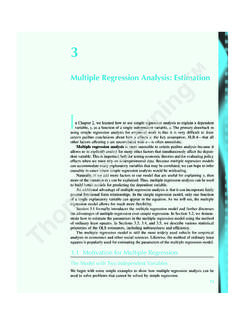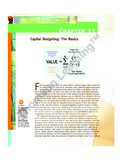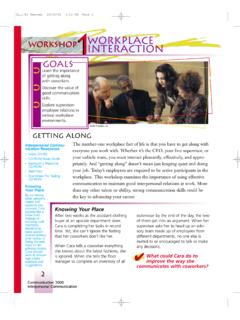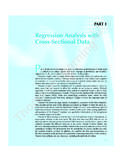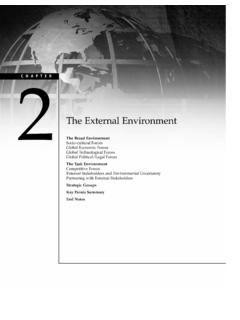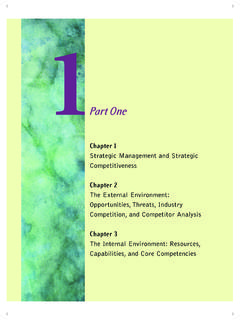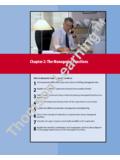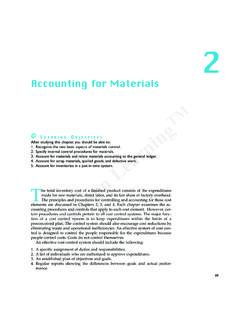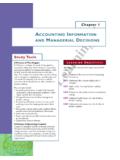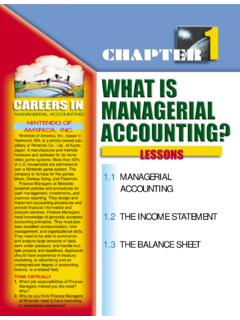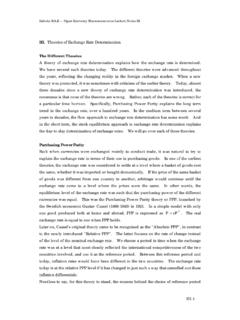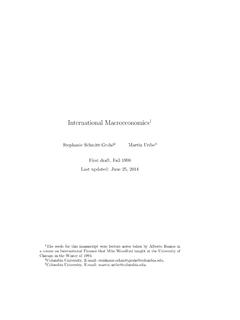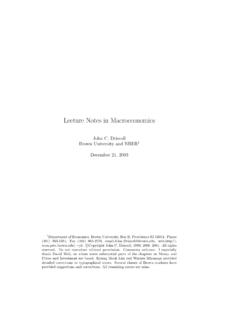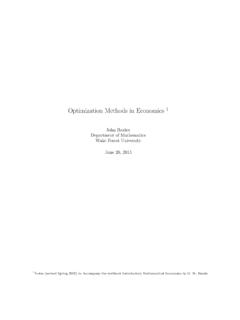Transcription of WHAT IS ECONOMICS? - Cengage Learning
1 Thomson Learning Economics. The word conjures up all sorts of images: manic stock traders onWall Street, an economic summit meeting in a European capital, a somber television news anchor announcing good or bad news about the probably hear about economics several times each day. what exactlyis economics? First, economics is a social science, so it seeks to explain something about this sense, it has something in common with psychology, sociology, and politicalscience. But economics is different from these other social sciences, because of whateconomists study and how they study it. Economists ask fundamentally different ques-tions, and they answer them using tools that other social scientists find rather , SCARCITY, AND CHOICEA good definition of economics, which stresses the difference between economicsand other social sciences, is the following:This definition may appear strange to you.
2 Where are the familiar words we ordinar-ily associate with economics: money, stocks and bonds, prices, budgets, .. ?As you will soon see, economics deals with all of these things and more. But first, let stake a closer look at two important ideas in this definition: scarcity and choice. SCARCITY AND INDIVIDUAL CHOICET hink for a moment about your own life your daily activities, the possessions youenjoy, the surroundings in which you live. Is there anything you don t have right nowthat you d like to have? Anything that you already have but that you would likemore of? If your answer is no, congratulations! Either you are well advanced onthe path of Zen self-denial, or else you are a close relative of Bill Gates.
3 The rest ofus, however, feel the pinch of limits to our material standard of living. This simpletruth is at the very core of economics. It can be restated this way: We all face theproblem of scarcity. what IS ECONOMICS? CHAPTER1 CHAPTER OUTLINEE conomics, Scarcity, and ChoiceScarcity and Individual ChoiceScarcity and Social ChoiceScarcity and EconomicsThe World of EconomicsMicroeconomics and MacroeconomicsPositive and NormativeEconomicsWhy Study ECONOMICS? To Understand the World BetterTo Gain Self-ConfidenceTo Achieve Social ChangeTo Help Prepare for Other CareersTo Become an EconomistThe Methods of EconomicsThe Art of Building EconomicModelsAssumptions and ConclusionsThe Four-Step ProcessMath, Jargon, and Other Concerns.
4 How to Study EconomicsEconomics is the study of choice under conditions of study ofchoice under conditions of situation in which theamount of something available isinsufficient to satisfy the desire for Learning At first glance, it may seem that you suffer from an infinite variety of are so many things you might like to have right now a larger room or apart-ment, a new car, more clothes .. the list is endless. But a little reflection suggeststhat your limited ability to satisfy these desires is based on two other, more basiclimitations: scarce time and scarce spending power. The scarcity of spending power is no doubt familiar to you. We ve all wished forhigher incomes so that we could afford to buy more of the things we want.
5 But thescarcity of time is equally important. So many of the activities we enjoy seeing amovie, taking a vacation, making a phone call require time as well as money. Justas we have limited spending power, we also have a limited number of hours in eachday to satisfy our desires. Because of the scarcities of time and spending power, each of us is forced tomake choices. We must allocate our scarce time to different activities: work, play,education, sleep, shopping, and more. We must allocate our scarce spending poweramong different goods and services: housing, food, furniture, travel, and many oth-ers. And each time we choose to buy something or do something, we are also choos-ing not to buy or do something study the choices we make as individuals and how those choices shapeour economy.
6 For example, over the next decade, we may each as individuals decide to make more of our purchases over the Internet. Collectively, this decision willdetermine which firms and industries will expand and hire new workers (such as In-ternet consulting firms and manufacturers of Internet technology) and which firmswill contract and lay off workers (such as traditional brick and mortar retailers). Economists also study the more subtle and indirect effects of individual choiceon our society. Will most Americans continue to live in houses, or like Euro-peans will most of us end up in apartments? Will we have an educated and well-informed citizenry?
7 Will traffic congestion in our cities continue to worsen, or isthere relief in sight? Will the Internet create faster economic growth and more rap-idly rising living standards for years to come or just a short burst of economic ac-tivity that will soon subside? These questions hinge, in large part, on the separatedecisions of millions of people. To answer them requires an understanding of howindividuals make choices under conditions of AND SOCIAL CHOICENow let s think about scarcity and choice from society s point of view. what are thegoals of our society? We want a high standard of living for our citizens, clean air,safe streets, good schools, and more.
8 what is holding us back from accomplishingall of these goals in a way that would satisfy everyone? You already know the an-swer: society s case, the problem is a scarcity of resources the things we use tomake goods and services that help us achieve our goals. Economists classify re-sources into three is the time human beings spend producing goods and consists of the long-lasting tools people use to produce goods andservices. This includes physical capital, such as buildings, machinery, andequipment, as well as human capital the skills and training that 1 what Is ECONOMICS? ResourcesThe land, labor, and cap-ital that are used to produce goodsand time human beingsspend producing goods and tools used inproducing goods and capitalThe skills and train-ing of the labor make good use of the Internet,you will need the Adobe AcrobatReader.
9 It can be downloadedfrom economic question is: Whydoes Adobe give the Reader awayfree?http://As individuals, we face a scarcity of time and spending power. Given moreof either, we could each have more of the goods and services that we Learning refers to the physical space on which production takes place, as well as thenatural resources found under it or on it, such as oil, iron, coal, and producedin the economy comes, ultimately, from some combinationof these resources. Think about the last lecture you attended at your college. Youwere consuming a service a college lecture. what went into producing that serv-ice? Your instructor was supplying labor.
10 Many types of capital were used as physical capital included desks, chairs, a chalkboard or transparency projector,and the classroom building itself. It also included the computer your instructor mayhave used to compose lecture notes. In addition, there was human capital your in-structor s specialized knowledge and lecturing skills. Finally, there was land theproperty on which your classroom building the three resources, other things were used to produce your college lec-ture. Chalk, for example, is a tool used by your instructor, so you might think itshould be considered capital, but it is not. Why not? Because it is not long , economists consider a tool to be capital only if it lasts for a few years orlonger.
